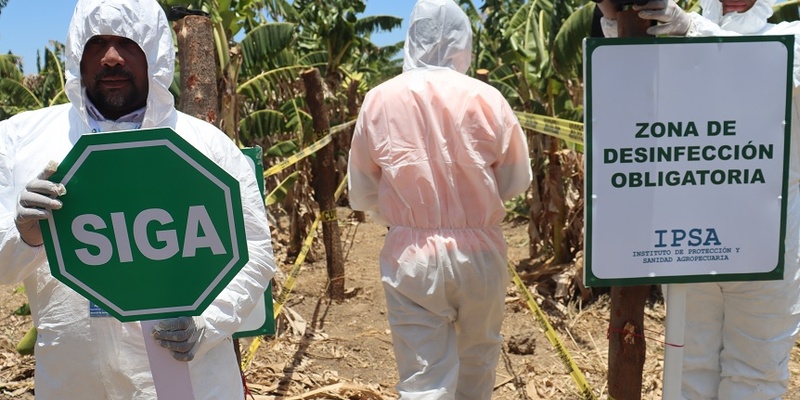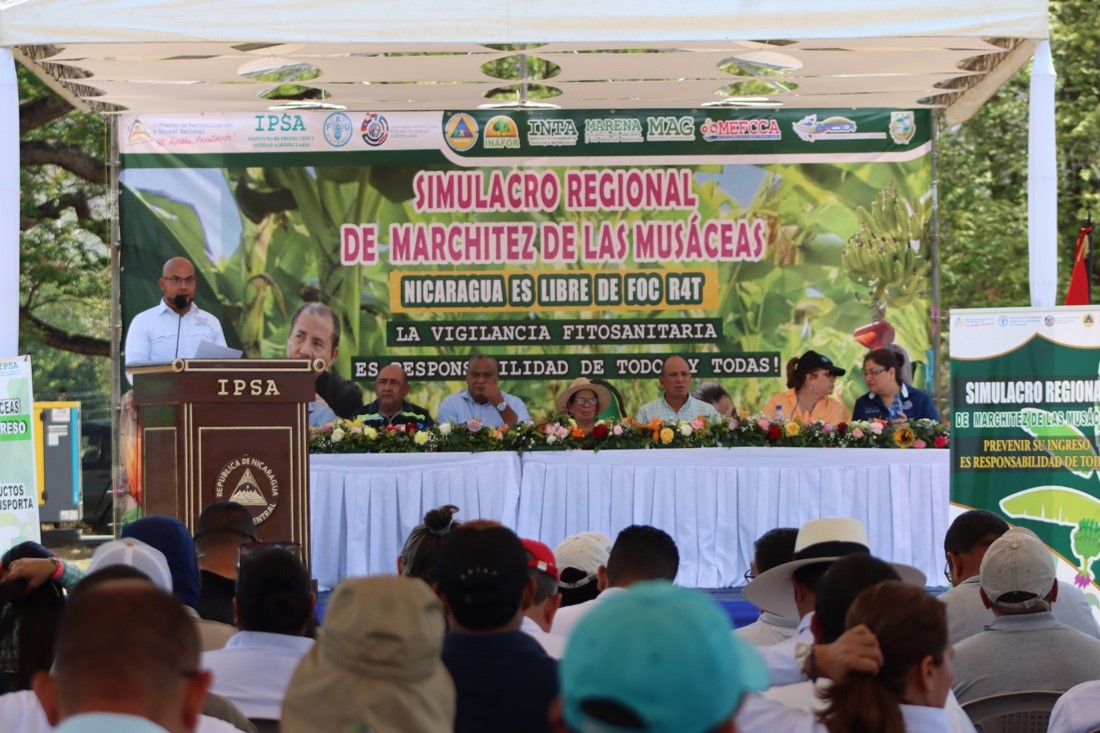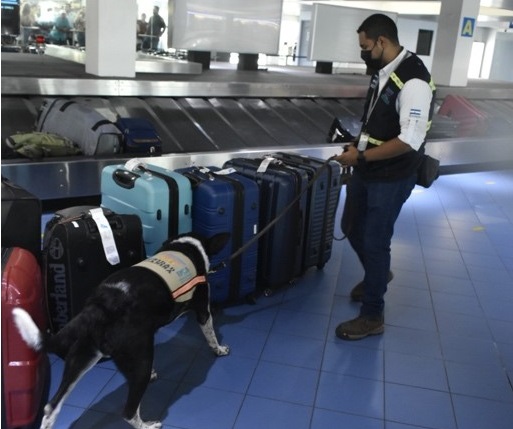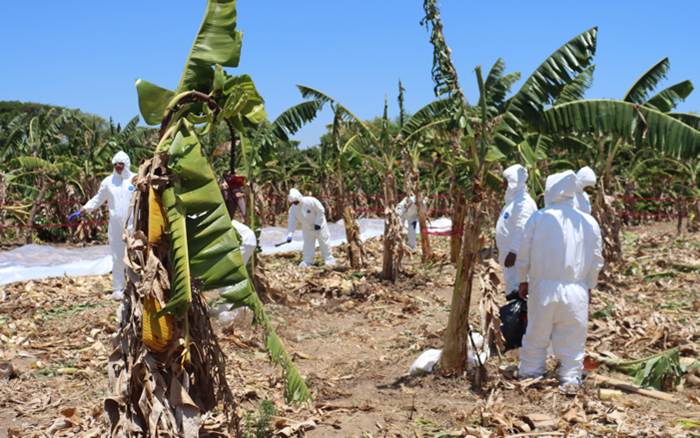SPOTLIGHT: Better safe than sorry: Nicaragua’s emergency plant protection efforts to curb Fusarium Tropical Race 4 (TR4) of banana
Posted on Fri, 30 Jun 2023, 12:57

©IPSA/ Fernando Medina
Detecting, preventing and responding to risks are vital aspects for managing the effects of harmful plant pests and diseases. Conversely, limited attention to phytosanitary issues could weaken entire food production systems and international trade, lead to food shortages and could cause major economic and social problems.
In 2019, a new strain of soil-borne fungal disease – banana Fusarium Tropical Race 4 (TR4) – was reported in Latin America. Currently affecting about 20 countries, TR4 is a major pest and a threat to banana production. It attacks the roots of banana plants and clogs their vascular system through which they receive water and minerals, eventually causing Banana Fusarium Wilt disease. The fungus spreads through infected plant materials and contaminated soil particles on items such as farm tools, shoes, clothes, animals and vehicles. Irrigation, drainage water, typhoons and storms can carry the TR4 fungus to new plantations and help its spread. The fungus can remain dormant in the soil or on host plants for decades. Once established in a field, TR4 can cause 100 percent yield loss and is challenging and costly to manage.
Since the spread of TR4 in the Latin America region, Nicaragua, the largest country in Central America, has been working tirelessly to protect banana farmers, consumers, producers and global trade from TR4. Banana is a major food and cash crop for Nicaragua, with the country exporting thousands of tonnes to countries including Belgium, Germany, Honduras, Ireland, the Netherlands and the United States of America.
Preparing for emergency scenarios
Nicaragua hosted week-long simulation exercises in April 2023 to strengthen the technical skills of relevant staff in the region to manage TR4. The enhanced capacity will help state and non-state institutions to collaborate in detecting, monitoring and responding to the disease. The simulations were part of a national campaign against TR4, which included raising public awareness and passing relevant legislation. The Instituto de Protección y Sanidad Agropecuaria (IPSA) organized the simulation exercises, with support from the International Plant Protection Convention (IPPC) and the Food and Agriculture Organization of the United Nations (FAO). Participants included representatives from 15 countries, as well as national and regional organizations such as National System for Disaster Prevention, Mitigation and Response (SINAPRED) and Organismo Internacional Regional De Sanidad Agropecuaria (OIRSA).

©IPSA/ Fernando Medina
Four simulation scenarios were staged. The first one, an airport simulation, featured two travellers arriving in the country with luggage containing hazardous materials such as potentially infectious banana plant material and shoes with contaminated soil. IPSA officials used specially trained dogs to detect the high-risk materials that were 'planted' in the luggage. In 2024, Nicaragua plans to train 40 dogs to support national and regional TR4 response, through the Escuela Canina de Nicaragua.

©IPSA/ Fernando Medina
A second simulation involved a potential plant pest outbreak from samples that a phytosanitary expert brought for testing. To demonstrate Nicaragua's capability and capacity to diagnose TR4, the national laboratory team used laboratory diagnostic protocols to thoroughly check the plant, eventually containing and mitigating possible risks.
The third simulation involved two quarantine officers posing as a couple arriving from Costa Rica by car, via the border point at Peñas Blancas. To detect a possible phytosanitary risk across the border with Nicaragua, a team of officers from the police, customs, veterinary services and plant health inspection units checked the couple’s car and luggage thoroughly. The phytosanitary threat was identified in an artifact wrapped in banana leaves. Officials incinerated the items and disinfected the travellers’ belongings.
The final simulation that took place on a banana plantation used digital tools to detect the possible presence of phytosanitary threats on plants and crops on farms. A contingency plan was used to contain and eradicate a possible outbreak. Overall, the simulations strengthened coordination amongst national and regional actors such as the Ministry of Natural Disasters and the army.

©IPSA/ Fernando Medina
On completion of the simulation exercise, Ricardo Sommariba, Executive Director of IPSA said, “We believe that IPSA is one of the first institutions in Central America and the Caribbean, and possibly in Latin America, where an entire country's system is coordinated in a single action in the event of a TR4 emergency. We carried out the first regional TR4 emergency simulation, with mobile laboratories and all the diagnostic tools necessary to respond to TR4. Nicaragua has established a technical team trained to face any TR4 emergency situation.”
National effort against plant pests
The simulation exercises are part of Nicaragua’s long-term plan to strengthen its phytosanitary system to manage plant health risks such as TR4. In 2019, the country carried out a phytosanitary capacity evaluation (PCE), through which the national plant protection organization (NPPO) and stakeholders were able to identify and address gaps in monitoring, planning and responding to plant health emergencies, especially at Nicaragua's borders.
The PCE process helped Nicaragua develop tools to mobilize and manage plant health resources. It helped improve collaboration with relevant national and international actors such as producers, exporters, importers, transporters, universities and government institutions. The PCE was conducted by IPSA with support from the IPPC Secretariat and FAO in Nicaragua.
Nicaragua also revised its national plant health laws and enacted the Nicaraguan Phytosanitary Protection Law in 2020. With this law, Nicaragua became fully compliant with the IPPC, particularly in implementing standards and recommendations for plant health and trade of plants and plant products. In May 2023, Nicaragua declared TR4 a phytosanitary emergency and established processes to prevent and manage its introduction in the country.
IPPC Secretary Osama El-Lissy commended Nicaragua for championing prevention, preparedness and response to TR4 of banana and for embodying the aspirations of the IPPC.
“Banana Fusarium TR4 is a menace. If we are to ensure that the people of Nicaragua, the Americas and the world have access to nutritious bananas, we must adopt measures to prevent the introduction and spread of TR4 to new areas,” he said.
“I commend Nicaragua for taking action to prevent TR4 and I encourage others affected by the problem to consider the country’s best phytosanitary practices in their own systems. The IPPC Secretariat and community remain committed to working with contracting parties and all stakeholders to prevent and effectively manage TR4 so that widely traded commodities such as banana are protected from plant pests. This way, we can safeguard food security, particularly in countries that depend on banana for food and trade,” he added.
To help countries improve their capacity to deal with plant health emergencies, the IPPC recently produced two important guides namely, Emergency Preparedness: A guide for developing contingency plans for outbreaks of quarantine pests and Prevention, preparedness and response guidelines for Fusarium Tropical Race 4 (TR4) of banana.
Related information
Contingency plans for phytosanitary systems
How Nicaragua’s new plant health law is helping smallholder farmers

